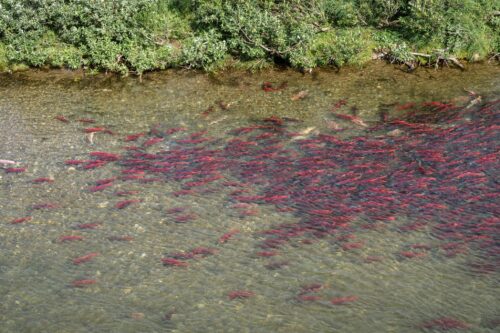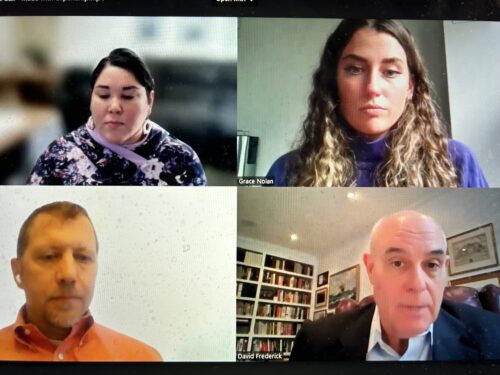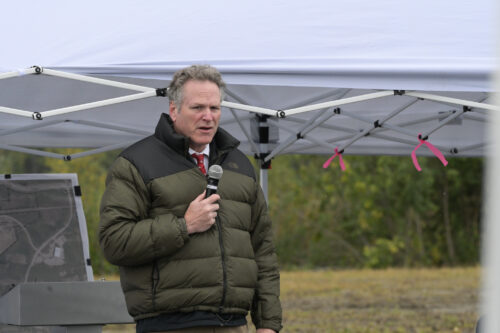
Bristol Bay Tribal Groups File Amicus Brief As Pebble Mine Saga Heads To SCOTUS
The following appears in the December issue of Alaska Sporting Journal:

BY CHRIS COCOLES
The state of Alaska – with Gov. Mike Dunleavy as its front man – wants to take the Pebble Mine saga to the highest court in the land. Bristol Bay’s Native organizations are fighting to protect their culture and traditions.
While the longtime proposed copper and gold mine project has officially been scuttled by Environmental Protection Agency Clean Water Act safeguards, the latest twist involved Gov. Dunleavy announcing that he and Alaska Attorney General Treg Taylor would seek intervention
from the United States Supreme Court to reverse the EPA’s decision (Alaska Sporting Journal, August 2023) via legal action.
Fast forward to November, and an Alaskan Native coalition led by United Tribes of Bristol Bay and Bristol Bay Native Corporation filed an amicus brief “to counter Gov. Dunleavy’s lawsuit against the U.S. Environmental Protection Agency for its Clean Water Act veto of the Pebble Mine,” as stated in a press release.
A day later, the principles who filed the brief held a press conference to discuss the details of their arguments. United Tribes of Bristol Bay executive director Alannah Hurley, a veteran of a decades-long quest to ensure Pebble never happens, stated, “Unfortunately, after 20 years, we’re still here fighting a hostile governor trying to transform our home into a toxic mining district.”
“Gov. Dunleavy refuses to acknowledge the facts, the law, the science and is disregarding not only Alaskans, (but) the millions of people in this country who used their voices in support of protecting Bristol Bay,” Hurley added. “Their lawsuit ignores the EPA’s work and action that has spanned three Presidential administrations, multiple lawsuits and is grounded into years of science.”

A UNIQUE CASE
Washington, D.C.-based attorney David Frederick, a partner at law firm Kellogg, Hansen, Todd, Figel & Frederick PLLC, who represents the tribal coalition in the amicus brief, called the state of Alaska’s specific lawsuit “a really unique procedure.”
“Where Article Three of the Constitution is invoked to resolve the dispute between a state and another state or a state and the United States, what Alaska is seeking to do here is jurisdictionally unprecedented in our research,” he said. “We have not found a single case in which a state has sued the United States directly in the Supreme Court for the challenge (of) an agency action like the EPA’s 404(c) determination.”
“Similarly, we have not found a case where a state has sued the United States claiming a breach of contract or a taking of property, which Alaska serves here, instead of going to the court of federal claims, which Congress specifically set up to handle these kinds of disputes. So what Alaska is seeking to do here, it is unprecedented, it has no logic in the way that Congress has determined the jurisdiction of federal courts or cases to be brought against the United States Government. And we urge in very strong terms in our amicus brief that the Supreme Court deny Alaska’s motion used to file a complaint.”
Frederick expects the Supreme Court to decide whether to add the case to its docket list in January, and he added that if it, as expected, denies the state of Alaska’s motion to proceed, “it will be up to Alaska to decide its next move. In our case, we believe that the normal process would be for Alaska to file a (federal) District Court action challenging the EPA’s determination, and that the process would play out pursuant to a suit brought back to Alaska.”
In response, Pebble Limited Partnership and parent Canadian-based mining company Northern Dynasty Minerals filed their own amicus brief.
“It is a critical policy choice, buried under a comparatively modest provision in the Clean Water Act. Northern Dynasty and its historical partners have collectively invested over $1 billion to develop a comprehensive plan to bring the Pebble copper to market,” Northern Dynasty’s brief stated. “For EPA to destroy what the state and the company worked so hard to create will not only deprive the United States of one of its largest potential copper sources, but will also discourage and impede investment in other potential mines.”
And for their part, United Tribes of Bristol Bay and Bristol Bay Native Corporation – which are two of several commercial fishing, conservation and environmental organizations as well as Bristol Bay sportfishing lodges and other businesses that have dug in against Pebble – are willing to work with the state to ensure that the mine never gets off the ground as well as protect Bristol Bay’s multi-billion-dollar salmon fishing industry.
“We’re open to discussions in the governor’s office as to what that would look like. Undoubtedly, the state of Alaska is a stakeholder in this, as are our organizations. And we want to have that dialogue as opposed to being in court and litigating,” said Daniel Cheyette, VP and associate general counsel at Bristol Bay Native Corporation.
Cheyette also acknowledges that the plot twists seen in this saga could shift momentum again.
“We believe in the administrative record that supports what the EPA has done. We believe that it is durable and will stop Pebble. But administrations change. It is possible to be administratively undone,” he said. “So while we don’t think it would happen, we certainly are interested in more durable legislative proposals that would more permanently protect the region from threats like Pebble.”

WHAT DO THE PEOPLE WANT?
In October, Dunleavy spoke at the Alaska Miners Association Conference and reportedly said that his comfortable reelection in the gubernatorial race contrasts the notion that as one of Alaska’s most vocal elected proponents for Pebble, it would affect his chances of remaining the incumbent.
“I was told if I supported Pebble, I would never win another election. Well, I don’t know. I’m here. I’m still here,” Dunleavy said at the conference.
When told about Dunleavy’s remarks, Hurley and Cheyette dismissed the claims. Alaska’s Congressional leaders in Washington – Republican Sens. Lisa Murkowski and Dan Sullivan, and Democratic Rep. Mary Peltola – have in various degrees opposed the project. Peltola, like Dunleavy, also recently won an election to win Alaska’s only seat in the House, replacing the late Rep. Don Young.
“The governor trying to claim that his reelection is somehow an indication that people in this state overwhelmingly support the project is just not true,” Hurley said. “It’s a really big assertion that there is no backing for.”
“Gov. Dunleavy is completely out of touch with the people he claims to represent with this outrageous lawsuit. Time and time again, the vast majority of Alaskans have called on our elected leaders to stop the proposed Pebble Mine, but Gov. Dunleavy is clearly on a reckless mission to defend this dead project regardless of the law, science and cost to Alaskans.”
FIGHTING FOR THEIR TRADITIONS
Perhaps no single entity in the long-standing fight against Pebble has more at stake than Bristol Bay’s Native community. As the site of one of the world’s last great salmon runs, Bristol Bay has fed generations of families. On its website, United Tribes of Bristol Bay states, “We are a tribal consortium working to protect the traditional Yup’ik, Dena’ina and Alutiiq ways of life in Southwest Alaska that depend on the pristine Bristol Bay Watershed and all it sustains.”
Hurley has made passionate pleas in the past to maintain her family’s livelihood of relying on returning salmon year after year within Bristol Bay. She feels confident in the 404(c)’s administrative record and the EPA’s Clean Water Act safeguards that for now would protect the region from the Pebble Mine.
“But it is clear with the over 20 other active mining proposals (in Alaska), that our region is still in need of broader watershed-wide protections through Congressional action and any type of legislation that’s going to help us ensure that our grandchildren are not fighting these projects piecemeal from now until eternity,” she warned. “That’s not fair to the people of Bristol Bay; that’s not fair to this state. We’re really in need of broader watershed-wide protections, so that Bristol Bay can continue being the salmon powerhouse that it has been for thousands of years.”
In a statement, Russell Nelson, chair of Bristol Bay Native Corporation’s board of directors, praised Alaskans in Bristol Bay and around the state for their persistence in preventing the mine’s construction.
“More importantly, EPA’s work in Bristol Bay is grounded in solid science and an important regulatory obligation to protect the invaluable salmon resource that has sustained our people since time immemorial,” Nelson said. “It is extremely disappointing that the state of Alaska is seeking to prop up a mine proposal that science and federal administrations of both parties have roundly rejected. As we have for well over a decade, BBNC and our shareholders will never back down from the fight for our water, our fish, our economy, and our way of life.” ASJ
Editor’snote:YoucanreadthefullAlaskatribal group’s amicus brief at supremecourt.gov/ DocketPDF/22/22O157/289176/ 20231109093415629_UTBB-BBNC%20 amicus%20brief%20–%20Alaska%20 v.%20U.S.%20–%20No.%20157%20 Orig.pdf.



